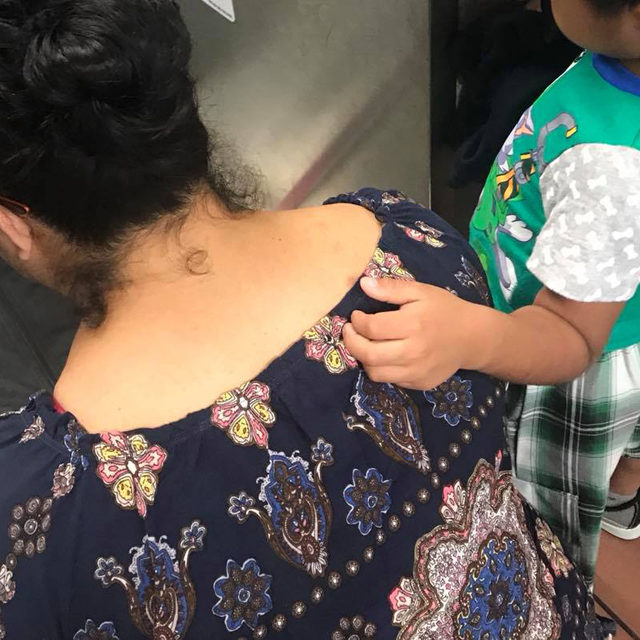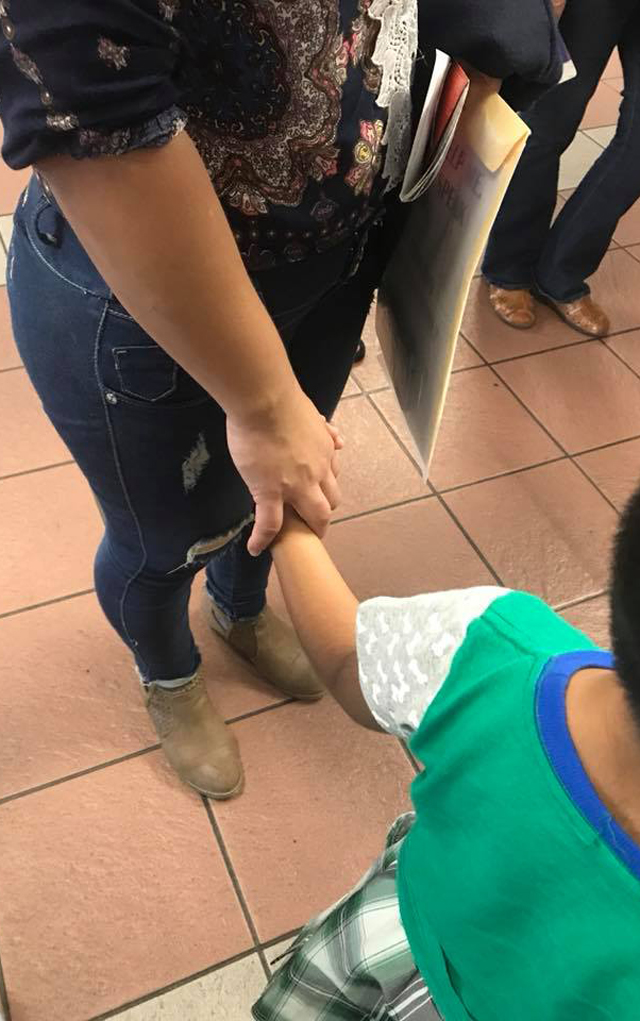
On Monday, July 23, attorney Laura Lunn with the Rocky Mountain Immigration Advocacy Network (RMIAN) went to immigration court at the Denver Contract Detention Center in Aurora unsure of what would happen. She was scheduled to represent a client from Central America, who had been separated from her son at the U.S. southern border, in a bond hearing that was still on the court’s docket. This despite the fact that on Friday, Lunn had received word that her client, along with about 30 other parents at the Aurora facility, had been transferred down to the Port Isabel Detention Center in Texas in an attempt by the federal government to expedite reunification ahead of a court-ordered deadline.
As the week progressed, Lunn’s uncertainty quickly turned to frustration. The procedures that usually dictate how she represents clients in immigration proceedings continued to change.
“This is not normal,” she says. “We have really mobilized to create this infrastructure to accommodate the people who are impacted by [the Trump administration’s zero tolerance] policy. And then it’s shattered when ICE changes their plans and people are taken away from their lawyers, the doctors who want to help with their cases, they’re taken away from homes people have prepared for them. This is not how things usually go.”
In the wake of Attorney General Jeff Sessions’ May announcement of the zero tolerance policy promising to criminally prosecute people crossing the border, the lawyers at RMIAN have worked to place about 40 cases of family separation that have come through the Aurora facility with pro bono attorneys in the Denver area. They’ve also taken on eight cases themselves. They’ve created a network of social workers, doctors and mental health professionals to help their clients’ cases. And they’ve connected them with organizations like Casa de Paz, a nonprofit based in Aurora that hosts immigrants released from the detention facility, and recently has been specifically helping parents separated from their children.
In the last several weeks Casa de Paz has hosted 13 parents waiting to be reunified with their kids. The organization has purchased calling cards, raised bond payments and covered transportation costs for parents either held in or recently released from the detention facility. At the last volunteer training, 315 people showed up. Volunteers have raised bond amounts through events and lemonade stands, they’ve gone to the detention facility to pay bond, they’ve met people outside the detention facility who have been released and brought them back to the Casa — a nondescript house in a suburban neighborhood. They’ve cooked them meals, provided clothes and toiletries. They’ve sat and listened to their stories, and helped make travel arrangements, sometimes even walking them through the airport, navigating security and making sure they board their flights.
“The theme is people from Central America who are fleeing violence in all forms, whether that’s domestic violence or gang violence or even in the family,” says Sarah Jackson, founder of Casa de Paz. “None of the parents that I talked to had any idea that their children would have been taken away from them at the border so they were in shock. … When the parents get here, the moms arrive to the Casa, you can just see it in their eyes, that they are 100 percent worried about their kid.”
The Casa recently hosted another of Lunn’s clients, who was separated from her 6-year-old son after being told he was being taken to go get a bath, the attorney says. Initially detained together after crossing the border in mid-May, it took her a month-and-a-half to locate her son while being held in detention in Aurora.
After almost two months in detention, Lunn’s client was released on bond after passing the first step of the asylum process. Volunteers from Casa de Paz delivered the bond money raised by the nonprofit to the Aurora facility, and the mother spent a few hours at the Casa before heading out on a flight to Texas. The mother and son were reunited on Tuesday, July 17, almost a week after the mother was released, with the help of Casa de Paz.
“I would be at a loss if I didn’t have them (Casa de Paz) as a resource,” Lunn says. “Because as hard as we work to get people bond amounts, if they can’t pay them, they can’t get out of detention. As hard as we work to get people the contact information to call their kids, they can’t make those phone calls if they don’t have money on their accounts. And as hard as we work to try and get bond amounts, they can’t get out if they don’t have a sponsor.”
 All of it was a response to a broken system with what appears to be a hastily implemented policy, but at least it was working.
All of it was a response to a broken system with what appears to be a hastily implemented policy, but at least it was working.
Casa de Paz found a local family in Colorado to sponsor the mother Lunn was representing at the bond hearing on Monday. They’ve offered her and her son a home while they work through their asylum claim.
After trying to get her client on the phone in the courtroom on Monday to no avail, the judge proceeded with the case, ultimately awarding the lowest bond amount of $1,500 for Lunn’s client.
Lunn, who hadn’t spoken to her client since she had been transferred, communicated with Jackson, who is currently in Texas helping the families previously held in the Aurora facility. Jackson arrived at the Port Isabel facility early Tuesday morning to present the cash bond, but when she got there, she was told Lunn’s client had already been released.
Lunn seems exasperated by the process.
“My level of frustration is unparalleled,” she says, after finding out that her client, who is scheduled for another court appearance in Colorado in a couple weeks, was released without her knowledge. “The rule of law no longer applies, if you don’t follow the rules and you don’t adhere to the law.”
A federal judge in California ordered the Department of Homeland Security (DHS), which is holding the parents, and Health and Human Services (HHS), which has custody of the children, to reunite families by Thursday, July 26. According to the ACLU, which brought the case forward, the Trump Administration told the court on July 23 that it had reunited or “appropriately discharged” approximately 46 percent of the 2,500 children between the ages of 5 and 17 who were separated from their parents as part of the zero tolerance policy. Children under the age of 5 were supposed to be reunited before July 10 as part of a court order, but only 58 out of 103 children in that age group have been reunited with their parents thus far.
“DHS and HHS are working tirelessly to reunite parents and children within the court-ordered timeline,” an Immigration and Customs Enforcement (ICE) spokesperson said in a statement. “To do so requires large-scale transfers of minors to ICE custody and both agencies have been actively engaged in managing the logistical challenges these large-scale transfers present.”
The ICE spokesperson said that at Port Isabel, the agency is using additional resources, and that for the most part, families have been reunified within hours of the children arriving at the detention facility.
But the last minute push to meet the deadline, including the mass transfer of both children and parents, has created a level of uncertainty for advocates and lawyers trying to help them.
“That’s the main question for all of these cases: Who is helping all of these family members understand their rights and obligations?” Lunn says. “There’s really no rhyme or reason as to what’s going on and nobody can figure out up from down.”
Meanwhile in Texas, Jackson scrambled to find out what happened, both with Lunn’s client and others who she had connected with in Aurora. “[We’re] dealing with a group of people who are traumatized and aren’t thinking straight and then we’re expecting them to navigate these murky waters that lead to nowhere,” Jackson says.
She posted several videos throughout the day documenting her attempts to locate people and help them on their way. By late afternoon, she had located Lunn’s client, who had been reunited with her son, in a nearby church. She bought them plane tickets back to Denver on Wednesday, where their sponsor family is ready to host them. It was a relatively successful ending to a confusing day.
“Today was crazy, it was up and down, and twisty and turning. And that is kind of how life is I guess, but I would consider today to be a success,” Jackson says in the video. “And tomorrow, I’m going to try and do as much as I can.”
On Tuesday afternoon, Lunn was finally able to talk to her client, who told her that before being released she had spent the night shivering on the floor at Port Isabel. Still, she took comfort in knowing that she was one step closer to seeing her son.
“The most profound thing is how when you do change the rules like this so often it’s with complete disregard for the feelings and emotions, the hopes and dreams of these wonderful human beings,” Lunn says. “It’s treating them like they’re not human, and shipping them around the country from place to place is disorienting especially once they have set roots here, where we have been able to connect them with so many people that are willing to help.”














